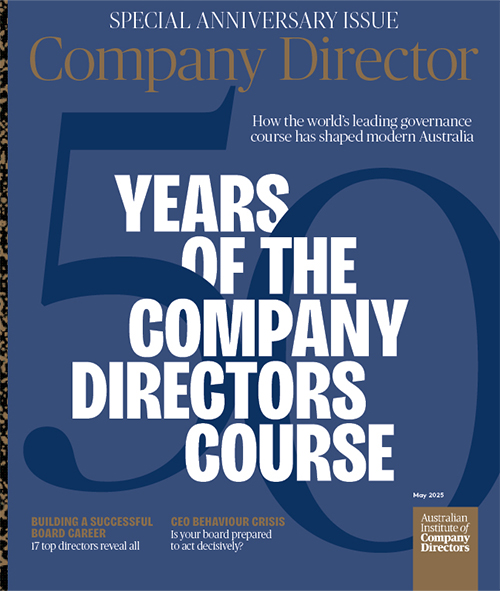A bipartisan call for the next government to prioritise a better regulation regime.
Australia risks being left behind in a global push to streamline and reduce red tape — a trend much broader than the headline-grabbing US “DOGE” initiatives.
The AICD argues that better and more fit-for-purpose regulation will support growth and productivity, and help lift Australia’s comparably poor innovation metrics.
Australia’s stagnating productivity performance was highlighted by the Productivity Commission’s March 2025 quarterly report as a long-term, structural challenge with no sustained uplift in over a decade.
Our election “ask” is three-pronged, focusing on better law-making, better digital governance and better targeted disclosure rules.
We are calling on the incoming government to make an internationally competitive, growth-focused regulation review a priority in its first 100 days, including a freeze on new regulation unless critical for community safety or redress.
The AICD is also championing a significant simplification of Australia’s now sprawling Corporations Act 2001 (Cth) and more targeted and less dense corporate reporting, including in the new Mandatory Climate Reporting regime.
Directors tell us that regulatory requirements — including Australia’s fondness for adding new layers of liability at board level — are a significant factor affecting risk appetite and crowding out board agendas.
Compliance with the law is, of course, a key obligation for any organisation and for all boards to oversee. Effective, targeted and enforceable laws underpin strong communities and economies. But poorly targeted, broad-brush and over-lapping regulations are a drag on prosperity and growth.
In the face of global economic shocks and geopolitical uncertainty, regions and nation states are launching proactive regulatory reforms to strengthen competitiveness and support growth and capital flows.
In January, the European Union (EU) set a target to reduce reporting for all EU entities by 25 per cent, and reduce imposts on small firms by 35 per cent. New directives to wind back the EU’s extensive sustainability and human capital reporting propose higher thresholds (so that 80 per cent of EU businesses would be exempt from mandatory reporting) and reduced intensity (reducing data points by almost 70 per cent).
In the UK, the Starmer government has committed to cut the cost of regulation on business by 25 per cent over this UK parliamentary term, with priorities in planning and approvals, regulator structure and consolidation, and across financial services regulation.
New Zealand established a Ministry for Regulation in March last year to spearhead red tape reduction, focusing initially on reviewing agriculture regulation, and a wide-ranging regulatory standards Bill.
As global uncertainty increases, it is important Australia considers all levers to boost growth — including reducing excessive or complex regulation — to support living standards and growth.
The AICD’s Three-Point Plan for better regulation, better digital governance and better targeted disclosures aims to help lay the foundations for this focus in national governance.
The AICD will work with other business and peak groups to champion our call to action with all sides of politics and as a priority for our new national government magazine.
FY25 regulatory priorities
The AICD advocates for balanced, fit-for-purpose regulations that support diligent directors to govern for growth. Our regulatory priorities are:
- Cyber regulation that supports effective board oversight
- Balanced policy and liability settings that reflect disclosure complexity
- Fit-for-purpose digital regulation that supports sound governance
- Long-term, coordinated policy approaches that strengthen national governance, reduce regulatory complexity and promote economic growth.
New Board Minutes in the AI Age
The AICD and Governance Institute of Australia — representing company secretaries — are releasing a new resource on quality board minutes, supported by a refreshed legal opinion. The New Board Minutes in the AI Age guide updates our 2019 advice and legal opinion from Dominique Hogan-Doran SC and Douglas Gration, released following the Financial Services Royal Commission — which brought the level of detail and attribution expected in board minutes into the spotlight.
Our new Board Minutes Practice Statement and legal opinion considers contemporary issues including the use of AI tools for recording meetings, producing drafts or transcripts and drafting minutes. We discuss suggested mitigations and better practice, to support boards and secretaries.
The new guidance will be launched (free for AICD members) on 21 May.
Register for the live session or recording here.
Practice resources — supporting good governance
AICD’s Policy team supports members with guidance on governance issues, including:
- AICD's Cyber Security Governance Principles
- Aged Care Director Guide
- Directors Guide to AI Governance
- Free Climate Governance e-learning
ASIC has super in the spotlight
The Australian Securities and Investments Commission (ASIC) has released a major report into superannuation fund handling of death benefit claims. In releasing the report, ASIC chair Joe Longo claimed that superannuation trustee boards risk “sleepwalking into a crisis” with inadequate oversight of claims handling.
Taking Ownership of Death Benefits: How trustees can deliver outcomes Australians deserve (March 2025) makes 34 recommendations, including lifting the quality and regularity of reporting to boards in the sector.
While the ASIC report notes variable practice across the 10 funds reviewed, and improvement programs underway, the regulator alleges that none of the funds reviewed had set performance objectives for end-to-end claims-handling times and there was no observed regular reporting of claims handling to trustee boards.
Longo spoke about superannuation governance and claims handling at the AICD’s March 2025 Australian Governance Summit.
“We’re not talking about anything new here,” said Longo.
“We are talking about well-established principles of governance and responsibility. Which is why, when I say that some super trustees are failing Australians in a critical service, it should be a warning to all directors not to let their fundamental duties slip.”
This article first appeared under the headline 'Red tape rescue' in the May 2025 issue of Company Director magazine.
Latest news
Already a member?
Login to view this content



